

Beneficios de los jardines verticales - Alicante Forestal. Beneficios para la salud: 1m2 de cobertura vegetal genera el oxígeno requerido por una persona en todo el año.

(Darlington, 2001)1m2 de cobertura vegetal atrapa 130 gramos de polvo por año. (Darlington, 2001)Un edificio de 4 plantas (60m2) con una fachada portadora de este sistema filtra al año 40 toneladas de gases nocivos. (Wolverton et al. 1989)Un edificio de 4 plantas (60m2) con una fachada portadora de este sistema es capaz de atrapar y procesar 15 kg de metales pesados. (Darlington, 2001)Mejora el rendimiento y reduce malestares de las personas que tienen vegetación en su lugar de trabajo. Beneficios directos: Ahorran espacio: Los muros de plantas se cuelgan verticalmente, aprovechando un espacio ya existente previamente.Ahorran tiempo: No es necesario eliminar malas hierbas.Ahorran dinero: Reducen hasta 5 grados la temperatura interior de un edificio en verano así como la mantienen en invierno, ahorrando hasta 500€/m2 al año.
Los techos que dan comida. Los techos que dan comida Un proyecto convierte en huertas las azoteas de casas humildes.

Techo verde. Los tejados que dan comida. Un proyecto que pretende convertir las azoteas de las casas humildes en efectivos huertos urbanos.

Con botellas plásticas de 2 litros y agua de lluvia cultivarán lechugas y rábanos, dando la posibilidad a las familias de cultivar sus propios alimentos, construyendo un tejido social – familiar, aumentando la biomasa vegetal y la calidad del aire. Ecotecho, una forma más de cultivar. CVU V4 N8 07. Mental process. A specific instance of engaging in a cognitive process is a mental event.
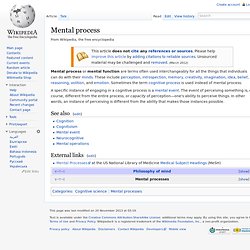
The event of perceiving something is, of course, different from the entire process, or capacity of perception—one's ability to perceive things. In other words, an instance of perceiving is different from the ability that makes those instances possible. See also[edit] External links[edit] Mental Processes at the US National Library of Medicine Medical Subject Headings (MeSH) Cognition. Cognition is "the mental action or process of acquiring knowledge and understanding through thought, experience, and the senses.
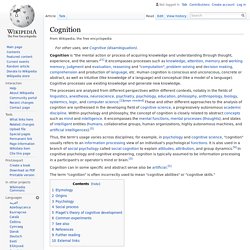
"[1] It encompasses processes such as knowledge, attention, memory and working memory, judgment and evaluation, reasoning and "computation", problem solving and decision making, comprehension and production of language, etc. Human cognition is conscious and unconscious, concrete or abstract, as well as intuitive (like knowledge of a language) and conceptual (like a model of a language). Cognitive processes use existing knowledge and generate new knowledge. Cognition can in some specific and abstract sense also be artificial.[5] The term "cognition" is often incorrectly used to mean "cognitive abilities" or "cognitive skills. " Sleep deprivation disturbed regional brain activity in healthy subjects: evidence from a functional magnetic resonance-imaging study.
Causes and consequences of sleepiness among college students. Drowsy%20Driving Key%20Messages%20and%20Talking%20Points. Sleep deprivation. Physiological effects[edit] Main health effects of sleep deprivation.
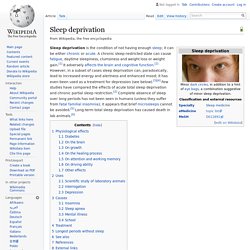
Generally, sleep deprivation may result in:[7][8] Diabetes[edit] It has been suggested that people experiencing short-term sleep restriction process glucose more slowly than individuals receiving a full 8 hours of sleep, increasing the likelihood of developing type 2 diabetes.[19] In 2005, a study of over 1400 participants showed that participants who habitually slept few hours were more likely to have associations with type 2 diabetes.[20] However, because this study was merely correlational, the direction of cause and effect between little sleep and diabetes is uncertain.
The authors point to an earlier study which showed that experimental rather than habitual restriction of sleep resulted in impaired glucose tolerance (IGT).[21] On the brain[edit] The temporal lobe, which is a brain region involved in language processing, was activated during verbal learning in rested subjects but not in sleep-deprived subjects. Managing sleep and wakefulness in a 24-hour world. Effects of sleep reduction on the phonological and visuospatial components of working memory. Sleep Duration and Academic Performance Among Student Pharmacists. Study Resource for Kolb's An Introduction to Brain and Behavior - Cram101 Textbook Reviews. Sleep deprivation: Impact on cognitive performance. An Introduction to Brain and Behavior - Bryan Kolb, Ian Q. Whishaw. From authors Bryan Kolb and Ian Whishaw, and new coauthor G.
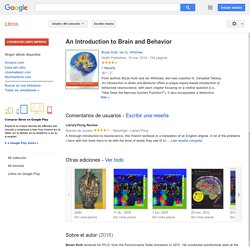
Campbell Teskey, An Introduction to Brain and Behavior offers a unique inquiry-based introduction to behavioral neuroscience, with each chapter focusing on a central question (i.e., "How Does the Nervous System Function? "). It also incorporates a distinctive clinical perspective, with examples showing students what happens when common neuronal processes malfunction. Now this acclaimed book returns in a thoroughly up-to-date new edition.Founders of a prestigious neuroscience institute at the University of Lethbridge in Alberta, Canada, Kolb and Whishaw are renowned as both active scientists and teachers. G. Human Cognitive Abilities: A Survey of Factor-Analytic Studies - John B. Carroll - Google Books. Cognition. Cognition is an international journal that publishes theoretical and experimental papers on the study of the mind.
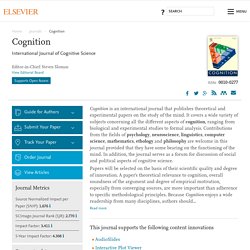
It covers a wide variety of subjects concerning all the different aspects of cognition, ranging from biological and experimental studies to formal analysis. Contributions from the fields of psychology, neuroscience, linguistics, computer science, mathematics, ethology and philosophy are welcome in this journal provided that they have some bearing on the functioning of the mind. GetSharedSiteSession?rc=4&redirect= Human Cognitive Abilities: A Survey of Factor-Analytic Studies - John B. Carroll - Google Books. Human Sleep and Cognition: Basic research - Gerard A. Kerkhof, Hans P. A. van Dongen - Google Books.